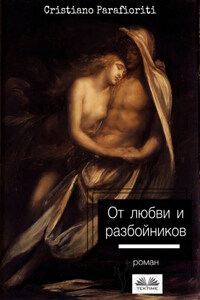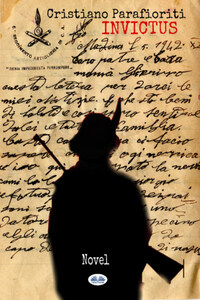Original title: D’amore e di briganti
Translated by: Giovanna Bongiovanni
A Rebel in Love
Cristiano Parafioriti © 2021
Cover by
Nunzio di Dio
Layout and editing by
Salvatore Lecce
“I want them all dead! They are all peasants, bandits and enemies of the Savoy, enemies of Piedmont, the Bersaglieri and the world. Death to the peasants, death to these southern sons of bitches, I don't want any witnesses, we'll say it was the bandits.”
(Colonel Pier Eleonoro
Negri by order of General
Enrico Cialdini, Lieutenant
of King Vittorio Emanuele
II, August 1861)
This is a work of fiction. Characters, organisations, and circumstances are the product of the author's imagination or, if they existed, used for narrative purposes. For the rest, any resemblance to actual events and people is entirely coincidental. Or almost.
In Galati Mamertino, Sicily, Calogero Emanuele, known as “Bau”, gets up early and is conscious of having to start another day of work in the town hall. Like many Sicilian fathers, his children are scattered across Italy for work and, of course, this distance cannot help but make him get out of bed a little sadder.
Every damn morning.
Spring has just begun and here in the Nebrodi mountains, there is a timid sun. At dawn it rises from the mountain of Rafa and a few warm rays strike the wrinkled tiles of the main square of this remote village, but they do not warm the chilly air and the numb bodies of those getting started.
Calogero Bau drinks his coffee at the Bar Ciccio, smokes his second cigarette and stares absently at the few passers-by and the imposing Mother Church. At that very moment, his heart turns dark. He thinks of don Peppe Emanuele, known as Malupilo, the evil hair, his father, who had died only a few years before, and who was a pillar of that church, always involved in organising the events, preparing the procession and the Masses, and unconditionally serving the Lord and the clergy. He might have seemed a little gruff at times, but he was just old-fashioned, in the good sense of the word, a man of few words and a lot of work. When he passed away, it was as if an aisle in that church had collapsed, and it was even worse for his son Calogero, who had relied on this man for his whole life.
Calogero Bau has a wife, three young sons, an elderly mother and a “thornback” sister who still lives in Galati. He is employed by the town hall – a luxury nowad
ays – and making a living as best he can. A cup of coffee, a couple of cigarettes and then he's off in his blue Fiat Punto to work at the Records Office, just outside the village on the road to Tortorici.
Every damn morning.
It was a cold and dark afternoon. My friends from the Pilieri neighbourhood and I were in the woods near Trungali. It was a bit of a creepy place because of the dilapidated church, and people in Galati Mamertino used to say terrible things about it. However, Ture S., our leader, had decided to build a hut nearby, next to the small stream. He believed that it would be a proof of bravery. We had brought some wooden planks, a ball of wire stolen from a building site and other necessary tools. We worked on it for more than two hours until our hut was ready. We were children and building a hut in the forest was an important mission. We had wooden swords, bows made of string and imaginary enemies; we were fearless in our own way.
After munching on some hazelnuts and a few unripe chestnuts inside the hiding place, we noticed that the sky was darkening and drops started to fall. Then it grew heavier and heavier, and the thatched roof could no longer shelter us all. We fled in disarray, some of us through the woods, others down into the valley, and I sheltered under the archway of the entrance to the ruined church of Trungali. Besides the shivering cold, the shivers of dread slowly crept in. The ruins of that temple protected me from the rain but not from fear. Indeed.
Rumours had it that a young girl had died nearby centuries ago. In an attempt to escape the Baron of Galati and owner of the land, who wanted to own her, the girl had fallen to her death on the sharp trunk of a freshly cut green hazel grove. Nobody had seen the baron trying to force himself on her, and the death of the girl had been dismissed as a fatal tragedy.
Though unpunished by the public, the nobleman was assailed by remorse and, in an attempt to relieve his soul, decided to build the church on the crime scene. But the idea turned out to be a bad one from the start, a harbinger of dark omens and misfortunes. Finally, one summer night, a disastrous fire started mysteriously from the church itself and engulfed the surrounding woods. After three days of fierce fighting against the flames, which seemed to be fuelled by a mysterious force, the fire was finally doused, the last flames had been extinguished, revealing the now charred body of the baron to some peasants. The young girl's revenge had been carried out at last, in some sinister way.










